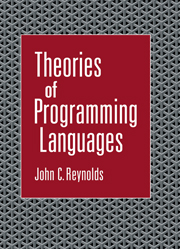Book contents
- Frontmatter
- Contents
- Preface
- 1 Predicate Logic
- 2 The Simple Imperative Language
- 3 Program Specifications and Their Proofs
- 4 Arrays
- 5 Failure, Input-Output, and Continuations
- 6 Transition Semantics
- 7 Nondeterminism and Guarded Commands
- 8 Shared-Variable Concurrency
- 9 Communicating Sequential Processes
- 10 The Lambda Calculus
- 11 An Eager Functional Language
- 12 Continuations in a Functional Language
- 13 Iswim-like Languages
- 14 A Normal-Order Language
- 15 The Simple Type System
- 16 Subtypes and Intersection Types
- 17 Polymorphism
- 18 Module Specification
- 19 Algol-like Languages
- Appendix: Mathematical Background
- Bibliography
- Index
3 - Program Specifications and Their Proofs
Published online by Cambridge University Press: 28 January 2010
- Frontmatter
- Contents
- Preface
- 1 Predicate Logic
- 2 The Simple Imperative Language
- 3 Program Specifications and Their Proofs
- 4 Arrays
- 5 Failure, Input-Output, and Continuations
- 6 Transition Semantics
- 7 Nondeterminism and Guarded Commands
- 8 Shared-Variable Concurrency
- 9 Communicating Sequential Processes
- 10 The Lambda Calculus
- 11 An Eager Functional Language
- 12 Continuations in a Functional Language
- 13 Iswim-like Languages
- 14 A Normal-Order Language
- 15 The Simple Type System
- 16 Subtypes and Intersection Types
- 17 Polymorphism
- 18 Module Specification
- 19 Algol-like Languages
- Appendix: Mathematical Background
- Bibliography
- Index
Summary
In this chapter, we will explore methods of specifying programs in the simple imperative language and of proving such specifications formally. We will consider both partial correctness, where one specifies that a program will behave properly if it terminates, and total correctness, where one also specifies that a program will terminate. For partial correctness we will use the form of specification invented by C. A. R. Hoare, while for total correctness we will use an analogous form based on the ideas of E. W. Dijkstra.
At the outset, it should be stressed that formal proofs are quite different than the traditional proofs of mathematics. A formal proof is sufficiently detailed that its correctness can be verified mechanically. In contrast, a traditional mathematical proof can be thought of as a blueprint that provides just enough information to allow a well-trained reader to construct a formal proof.
In fact, formal proofs are more prevalent in computer science than in mathematics. The most obvious reason is that only formal methods can be mechanized soundly. A more subtle reason, however, is the different nature of the proof task. Mathematical conjectures often contain no hint of why they might be true, but programs are invariably written by people who have at least a vague idea of why they should work. Thus the task of program proving is not to search over a broad space of arguments, but to refine an already existing argument until all of its flaws have been revealed.
This is not to say that every program merits formal proof. Experience with formal proof methods, however, also increases a programmer's ability to detect flaws in informal arguments.
- Type
- Chapter
- Information
- Theories of Programming Languages , pp. 54 - 80Publisher: Cambridge University PressPrint publication year: 1998



